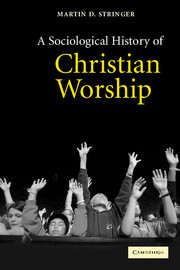Book contents
- Frontmatter
- Contents
- Preface and acknowledgements
- Introduction: Discourse, devotion and embodiment
- 1 Early Christian worship, texts and contexts to ad 300
- 2 Worship and the Christianisation of public space, 300–600
- 3 Hegemonic discourses in the worship of empires, 600–900
- 4 The dominant discourse of cosmological Christianity, 900–1200
- 5 Accessing the demotic discourses of devotion, 1200–1500
- 6 Worship and the rise of humanistic discourses, 1500–1800
- 7 The globalisation of Christian worship, 1800–2000
- Bibliography
- Index
4 - The dominant discourse of cosmological Christianity, 900–1200
Published online by Cambridge University Press: 03 December 2009
- Frontmatter
- Contents
- Preface and acknowledgements
- Introduction: Discourse, devotion and embodiment
- 1 Early Christian worship, texts and contexts to ad 300
- 2 Worship and the Christianisation of public space, 300–600
- 3 Hegemonic discourses in the worship of empires, 600–900
- 4 The dominant discourse of cosmological Christianity, 900–1200
- 5 Accessing the demotic discourses of devotion, 1200–1500
- 6 Worship and the rise of humanistic discourses, 1500–1800
- 7 The globalisation of Christian worship, 1800–2000
- Bibliography
- Index
Summary
INTRODUCTION: DOMINANT DISCOURSES
As we have seen in the Introduction, discourse is a widely used word that does not have a clearly defined and commonly agreed meaning. In this chapter I want to use the concept of a ‘dominant discourse’ as a way of expressing the nature of Christian language and thinking within most of the principal Christian societies at the turn of the first millennium. For the first thousand years of their history Christians, or more specifically Christian authors and their literature, understood themselves primarily in opposition to more or less specified others. At its inception Christianity was, of course, a minority religion with a strong missionary zeal. Through the fourth to the seventh century, and within most of the late Roman Empire, Christianity was still battling with various forms of paganism for the hearts and minds of the people. During the following four hundred years the missionary activity of Christianity in Northern and Eastern Europe, the rise of Islam and the internal conflicts within Christianity itself maintained a sense of being one among many competing religious discourses. By the eleventh century, however, especially in Western Europe and, I would suggest, within parts of the Byzantine Empire, the sense of being on the defensive about Christianity had largely disappeared, and Christian discourse had a confidence and sense of ‘rightness’ that profoundly affected the way in which liturgy was performed and understood.
- Type
- Chapter
- Information
- A Sociological History of Christian Worship , pp. 120 - 149Publisher: Cambridge University PressPrint publication year: 2005



